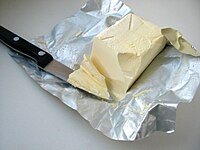
Photo from wikipedia
Obesity results from a temporary or prolonged positive energy balance due to an alteration in the homeostatic feedback of energy balance. Food, with its discriminative and hedonic qualities, is a… Click to show full abstract
Obesity results from a temporary or prolonged positive energy balance due to an alteration in the homeostatic feedback of energy balance. Food, with its discriminative and hedonic qualities, is a key element of reward-based energy intake. An alteration in the brain reward system for highly palatable energy-rich foods, comprised of fat and carbohydrates, could be one of the main factors involved in the development of obesity by increasing the attractiveness and consumption of fat-rich foods. This would induce, in turn, a decrease in the taste of fat. A better understanding of the altered reward system in obesity may open the door to a new era for the diagnosis, management and treatment of this disease.
Journal Title: Nutrients
Year Published: 2022
Link to full text (if available)
Share on Social Media: Sign Up to like & get
recommendations!